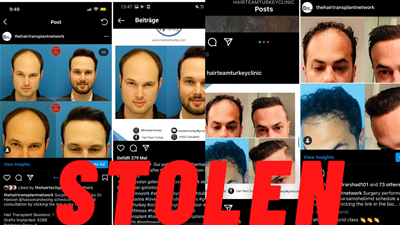The hair transplant industry is filled with landmines. It can be hard to discern the real from the fake, and with the prevalence of social media, it's even more complicated. Recently, we caught a clinic named Hair Team Turkey Clinic stealing almost a dozen hair transplant results and passing them off as their own. They even made up backstories, like the patient was from Germany, the results were past eight months, etc. One of the results they stole was close to a decade old. In this article, were going to teach you how to research and, most importantly, where to research.
Beware of Instagram and Facebook
Now, I'm not going to say that everything on Instagram is terrible, but you need to verify that the page can be trusted. It's so easy to steal pictures and pass them off as your own. It's also easy to buy likes, follows, and even verification badges. There are hair transplant pages right now on Instagram with over a million followers. They use the same hair mill tricks over and over again. They invest in their marketing, reach out to celebrities for covert endorsements, and fool thousands.
Beware of Clinic-Paid Influencers on Social Media
This one is harder to spot, but if you see someone on YouTube promoting a specific clinic and providing you with their WhatsApp number or direct email address. You can almost always bet that they are working with the clinic in some way. Either they are being paid directly, or they are trying to get their subsequent surgery for free. Either way, you should be wary of these types of reviews because they're not genuine.
Genuine Reviews on Hair Restoration Network
For over 15 years, the Hair Restoration Network has been the leading site for genuine hair transplant reviews. There are literally thousands of quality reviews spanning all the way back to the early 2000s. The most important thing is that you don't only see good reviews. You see the good, the bad, and sometimes even the ugly.
Diversifying your information is always a good idea. Hair loss forums have been great, but be careful because not all forums are created equal. Some forums claim to be unbiased, open, and genuine but turn around and delete negative reviews, silence unhappy patients or keep negative reviews private from the public.
Other great places to research and gain valuable information are as follows: Dr. Bisanga "bitesize with Bisanga" is a series on YouTube where Dr. Bisanga answers frequently asked questions about hair transplantation. Dr. Pradeep Sethi and Dr. Arika Bansal regularly post informative videos on YouTube on their Eugenix Hair Sciences channel. Dr. Parsa Mohebi regularly posts informative videos on TikTok and YouTube- Parsa Mohebi Hair Restoration is his channel name.
Conclusion
You can find false information everywhere online, especially on social media. There is good quality information on social media, but you need to know and trust the source. We regularly post informative content on our Instagram and YouTube channel @thehairtransplantnetwork on Instagram and Hair Transplant Network on YouTube. To find out how many grafts you need or to consult with one of our recommended surgeons, HERE.

